Thailand, one of Asia’s most tourism-dependent nations is looking to bring visitors back with new 90-day special visitor visas, which can be extended up to two additional times, for up to 270 days exploring Thailand, and the visas may be available as early as October 2020.
Following the announcement of the re-opening of Phuket from 01 October with stringent conditions, Thailand Prime Minister Prayut Chan-o-cha announced on September 15 a new 90-day visa for long-stay tourists, once again with extremely strict conditions.
This new visa will be the first stage of general tourism reopening in Thailand, by first allowing long-stay tourists who agree to spend at least 90 days in Thailand in the effort to jump-starting the shattered industry.
The process to obtain the visa not only is very long with a whopping 31 steps of paperwork (as reported on the website of the Tourism Authority of Thailand) but it also required a mandatory 14 days quarantine and then a minimum 90-day vacation’s, not to mention the mandatory travel insurance, fit to fly certificate, health certificate issues 72hrs before the flight, proof of booking and payment for the 90 days post quarantine accommodation, etc. If the effort, costs, or time have not put you off, Thailand has a fantastic plan to reboot slowly and safely reboot tourism.
If they have, you might need to wait a while. Here is are some information you need to know about Thailand’s plan to start bringing tourists back, maybe as soon as October 2020.
Thailand’s 90 Day Visitor Visa
Unlike other countries with relatively simple new COVID-19 testing restrictions and varying degrees of quarantine, Thailand’s only current plan leaves much to be desired, and it looks quite cumbersome.
While this news was released 9 days ago, it is still very unclear and no further details have been released to date and the following is what has been made public.
Let’s recap the main requirements that are part of the 31 step process for a tourist to take advantage of the new Thailand STV visas, all potential visitors must:
Visa Rules
Cost: 2000 baht
Length: 90 days. The visa can be renewed two times just before expiry, making the total length of stay possible for up to 270 days.
How Many visas will be Issued: The Thai government has announced that they are planning to issue 1200 STV visas per month to start
Countries to be included: The list of countries that will be included in this scheme has not been released yet.
Quarantine Rules: All applicants who receive approved STV visas must agree to quarantine for 14 days upon arrival. It is unknown if this will only be at state facilities, or at approved hotels. After the quarantine is completed, the tourist will be granted free movement. No testing procedures have been mentioned yet, but they also could come into play as the visas are issued.
Proof of Stay: To qualify for the visa, tourists will need to show proof of a stay equalling a full 90 days or more. This will include apartment rental contracts, confirmed hotel bookings, lease of a condo, copy of ownership of a dwelling belonging to family/friends where the applicant will stay, the starting date of this program has not been announced, the Thai government said details will soon follow.
Basically, if you want to visit Thailand in the near future, current plans require no less than 104 days of prepaid accommodation, health exams, a private jet or seat booked on a chartered flight, and last but not least, a tracing app or bracelet to monitor all subsequent movements.
Here’s a look at each of the 31 steps, as highlighted by the Bangkok Post.
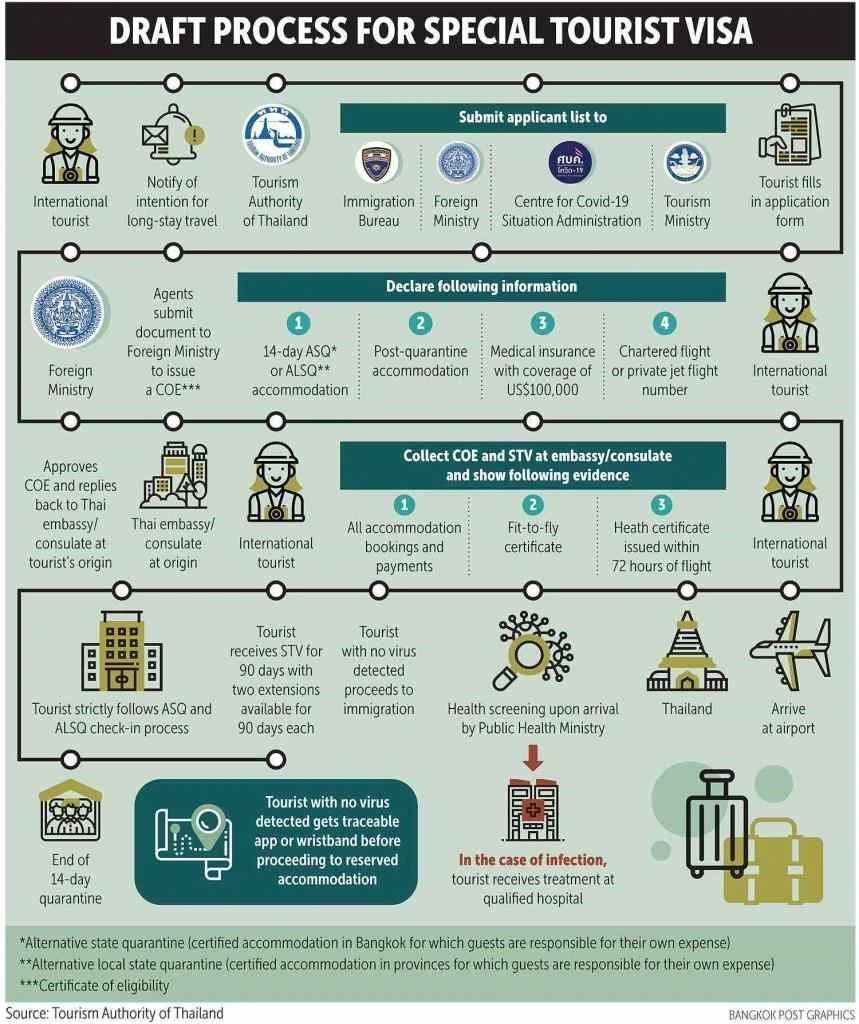
Is there a market for this? Maybe yes, but it’s certainly not “mass market”. Thailand’s cautious approach looks to be similar to those being offered by various countries, intending to attract people who will bring vital spending into neighborhoods for months on end, rather than a few nights at a time.
It may be better than no tourism at all, which other Asian countries are grappling with, but not much.
Travelers already face a myriad of challenges in 2020 with constantly changing border restrictions, health concerns, and uncertainty in financial markets. Thailand’s plans for travel tourism are perhaps better than nothing at all, but for a destination which last year required nothing more than booking a flight, it’s a difficult sell for many.
This is the first news of general tourism starting to resume in Thailand. Many expats, usual long-stay visitors, partners of Thai nationals, and other frequent travellers to Thailand have been waiting for any sign that Thailand will once again allow them to return.
Since July, Thailand has only allowed selected categories of foreigners to enter the country, including some medical tourists, direct family members of Thai nationals, business investors, and skilled foreign workers.
Prior to this recent STV visa announcement, the only other signal that Thailand was looking to accept tourists soon was the Phuket pilot project. The governor of the Tourism Authority of Thailand made a statement on August 21st confirming the government’s plan to open Phuket for international tourism on October 1st.
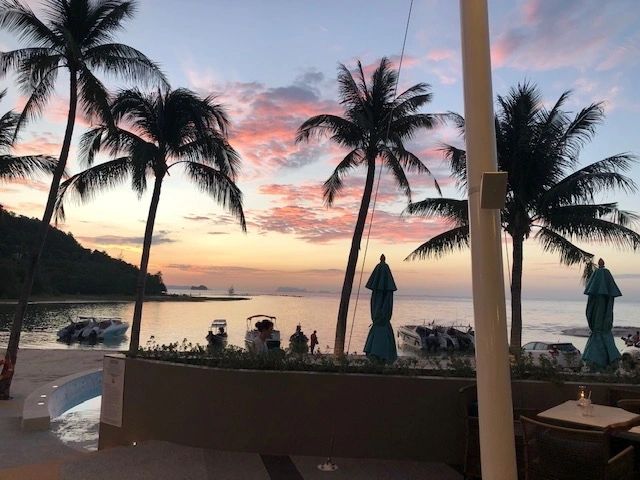
The reopening of Phuket for foreign visitors planned to act as a sort of pilot program for the rest of the country, testing how successful restarting the tourism sector in this current environment can be.
The Phuket reopening is planned with a minimum 30-day stay, many PCR tests, and a strict 14-day quarantine. While the program isn’t expected to launch until October 1st, the new STV Visa might be a more attractive option for visitors, pending on its actual start date.
Conclusion
Whilst Australian borders remain closed till at least next year, we are unable to even think about this offer. The long-stay visa aims to help Thailand’s tourism industry, which has been greatly affected by the pandemic. Thailand used to earn at least two trillion baht (90 billion AUD) a year from international tourist arrivals before the COVID-19 outbreak.
All things considered, Thailand wants to attract people who stay long term in the country now and hopefully spend a lot of their money. Those who own or rent a condominium don’t spend a lot of money compared to what they would pay to hotels. Most also eat more at home rather than eating out every day. The projections of how much money these individuals will spend might be miscalculated.
So you pay for a full 90 days, and a plane ticket proof in and out of the country, before even applying for the visa on the hopes that you are able to get approved and within the time frame that allows you to leave your country of origin after receiving the visa on time? It does not sound attractive to me! I am not sure if this will be attractive to many people.
Stay well!
Joe
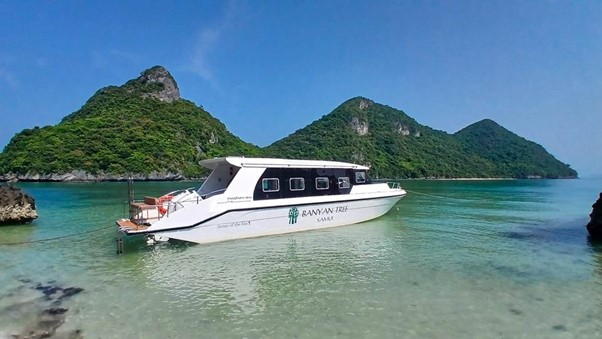 Banyan Tree Samui Launches ‘White Lotus’ Speedboat Tours
Banyan Tree Samui Launches ‘White Lotus’ Speedboat Tours 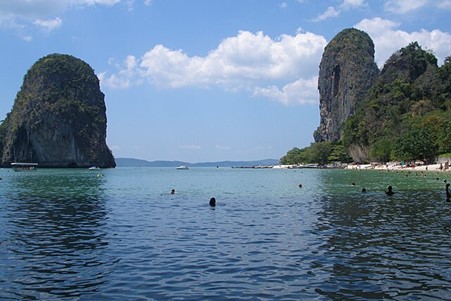 A Journey to Krabi: Thailand’s Hidden Gem That Takes Your Breath Away
A Journey to Krabi: Thailand’s Hidden Gem That Takes Your Breath Away 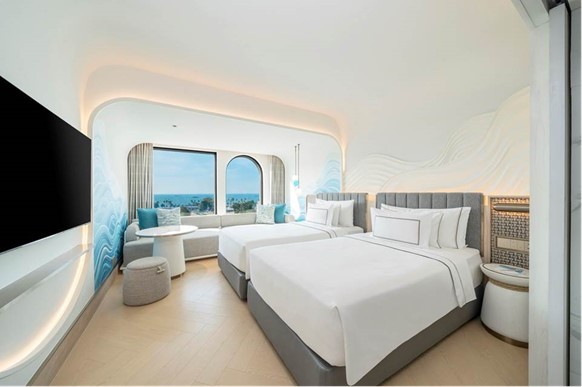 A Tribute to History and Culture: Meliá Pattaya Hotel Opens
A Tribute to History and Culture: Meliá Pattaya Hotel Opens 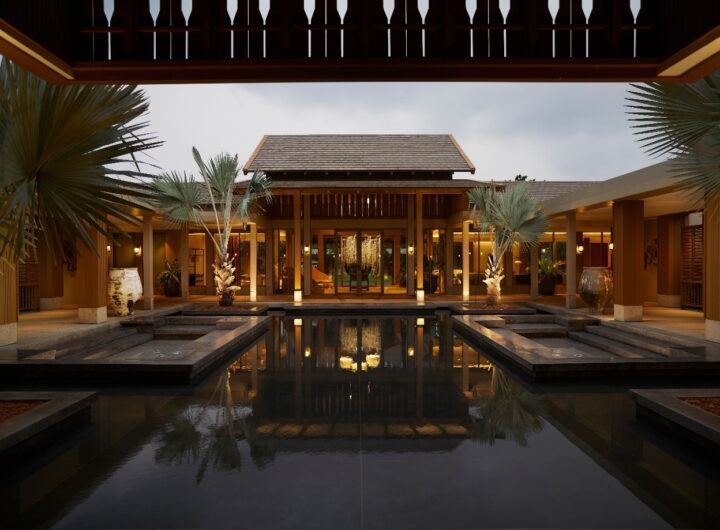 RAKxa Unveils Enhanced Personalised Programme: Experience the Pinnacle of Bespoke Wellness
RAKxa Unveils Enhanced Personalised Programme: Experience the Pinnacle of Bespoke Wellness  Experience Thailand Like a Star: Luxurious Retreats Inspired by White Lotus
Experience Thailand Like a Star: Luxurious Retreats Inspired by White Lotus  INNSiDE by Meliá Bangkok Sukhumvit To Debut This July
INNSiDE by Meliá Bangkok Sukhumvit To Debut This July 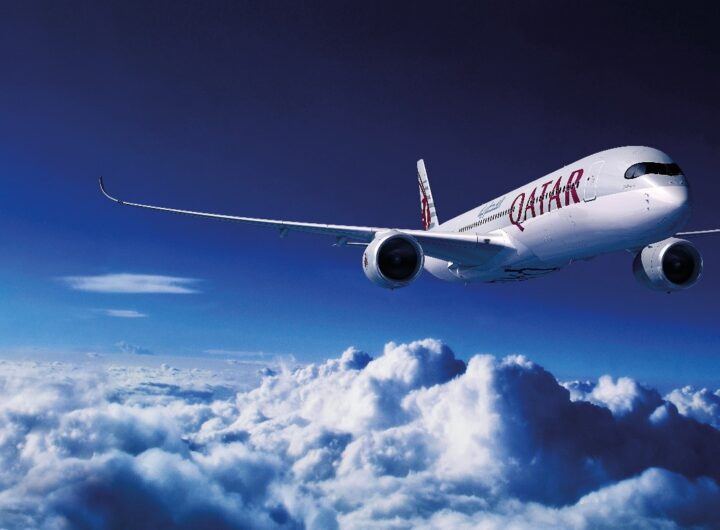 Qatar Airways Resumes Flights To Malta: Enhancing International Connectivity
Qatar Airways Resumes Flights To Malta: Enhancing International Connectivity  Viking Cruises Unveils 14 New Ocean Itineraries for 2026 & 2027
Viking Cruises Unveils 14 New Ocean Itineraries for 2026 & 2027 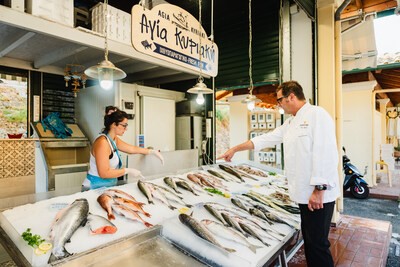 Seabourn Elevates Onboard Dining with New Menus and Local Flavours
Seabourn Elevates Onboard Dining with New Menus and Local Flavours 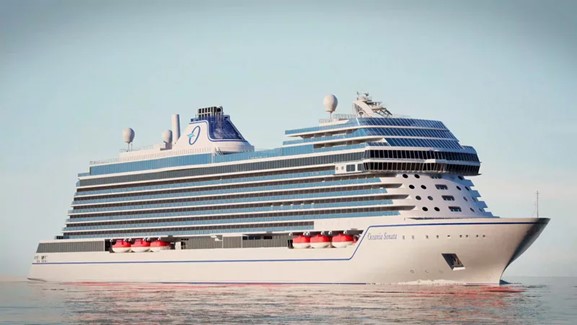 Oceania Cruises Marks a New Era with the Construction of the First Sonata Class Ship
Oceania Cruises Marks a New Era with the Construction of the First Sonata Class Ship 